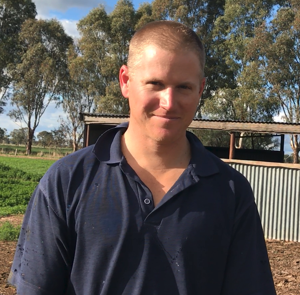With four children under the age of five, sleep is a precious commodity for Tongala dairy farmer Scott Fitzgerald and his wife, Anna.

Mercifully the couple is getting more sleep these days after participating in early rounds of the Farm Water Program, rolled out by the Goulburn Broken Catchment Management Authority.
Scott, 34 and his father Peter accessed the program to install high-flow channels, increase the size of their irrigation bay outlets and laser grade almost 40 hectares of the farm.
It’s meant Scott, who’s now taken over management of the family business, has halved the time required to irrigate the property.
“It’s been really good. With four little kids it means I’m not stuck watering night and day and I get to spend some time with the family,” Scott said.
“After the on-farm works we now have the ability to manage our system. We can, for example, water for four days and have three days break for the week. The 90 acres down the back used to take three days to irrigate and now we can do it in a day and a half,” he said.
But sleep wasn’t the primary reason Scott and his dad put their hands up for the Farm Water Program.
“We’ve got a fantastic (regional) system which provides water to our doorstep and to be able to utilise it on farm is imperative to ensure the future of our industry. The big advantage is the increased flow rate which means you cover a lot of land quickly, which is particularly important when things are dry.”
The father and son had long planned to modernise their irrigation system but were unable to afford it without participation in the program.
“It was fantastic to upgrade a large section of land in one go. Without this investment we’d only have been able to chip away at it, to best suit cash flow.”
Scott is a third generation dairy farmer. His grandfather was among the first to access water when the region was originally irrigated.
“He used to talk about teams of people with shovels and every outlet was a matter of shovelling a hole in the bank, letting it irrigate then filling the hole back up.
“Thankfully we’ve moved on from those days.”
While admitting his opinion is far from objective, Scott firmly believes on-farm modernisation is a worthwhile government investment.
“It’s crucial that a scheme like this exists. It’s important the land is kept in production, which is not only beneficial for the farmer but for the whole district.”
But like a lot of irrigators, he’s anxious about the amount of water leaving the district.
“It’s definitely a concern. But it’s a balancing act between being able to water efficiently and also having the water to irrigate.
“Personally speaking, for our farm we’ve relinquished enough. I don’t regret it but I can’t lose any more water. For the region, I’m not sure.
“We’ve made great use of rounds one and three and we’ve modernised nearly half of our farm so we’re happy and we wouldn’t want to give up (sell or transfer) any more water.”
The Farm Water Program, delivered by a consortium led by the Goulburn Broken CMA, has now funded over 600 individual irrigator projects worth over $160 million over five rounds. The consortium includes North Central CMA, North East CMA, Department of Environment, Land Water and Planning, Department of Economic Development, Jobs, Transport and Resources, Goulburn Murray Water, Dairy Australia, Murray Dairy and Northern Victorian Irrigators.